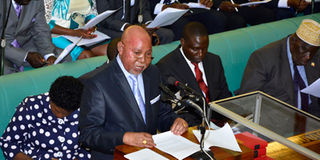MPs grill Gen Jeje Odongo over passport shortfall

Internal Affairs Minister, Jeje Odong before the floor of parliament recently. FILE PHOTO
What you need to know:
- To mitigate the likely adverse effects, Gen Odongo said, “the ministry has put in place criteria to regulate the current stock levels to ensure that stocks last up to the delivery of the next consignment”.
PARLIAMENT: If harsh words were strokes of a cane to be counted, then Gen Jeje Odongo, the Minister of Internal Affairs lost his count after he failed to convince legislators about the shortfall in ordinary passports.
The minister appeared before Parliament on Wednesday to explain the circumstances under which the passports used by majority Ugandans leaving the country, have been placed under restrictive issuance due to a sharp decline.
He blamed the problem on a rapid rise in demand, at the time the ministry was focusing on switching from machine readable passports, to the e-passport, as by regional undertakings.
“The ministry is experiencing an unprecedented increase in demand for the ordinary passports especially from those seeking employment abroad from 450-750 as daily passport applications, almost double the daily average demand,” he said.
To mitigate the likely adverse effects, Gen Odongo said, “the ministry has put in place criteria to regulate the current stock levels to ensure that stocks last up to the delivery of the next consignment”.
Under the mitigation measures, the ministry has limited issuance of ordinary passports to only proven medical cases, certified applicants proceeding on government business, students on scholarships and any other case of emergency in nature.
The minister’s statement attracted bitter reactions from the plenary with some lawmakers referring to him as “an incompetent fellow that should explain why he should not be indicted.”
Mr Mathias Mpuuga (DP-Masaka Municipality) blamed the minister for watching the situation run out of hand. Mr Mpuuga is the shadow minister for Presidency.
“I have just listened to a General making confession to incompetence and mismanagement…emergencies should never have been expected in these kinds of matters,” he said.
“What became of the planning function in the ministry of Internal Affairs, the minister must convince us as to why he should not be indicted for incompetence,” Mpuuga added.
Like Mpuuga, Mr Godfrey Atkins Katusabe (FDC-Bukonzo West) the shadow minister for Foreign Affairs said that the minister expressed no concern for the people, for whom it is a constitutional right to possess passports.
He said that the country was suffering from a leadership crisis, with “reckless ministers who do not care about the plight of the people.”
“The greatest challenge of leadership is the lack of ability to detect and solve a problem before it becomes a crisis, you should have seen this,” he said.
Mr Katusabe cited the breakdown of the radiotherapy cobalt machine at the Uganda Cancer Institute that has left many cancer victims stranded, and the recent outbreak of famine in the country as indicators of the same crisis.
Meanwhile, a sting came from the ruling government with Mr Kenneth Lubogo (NRM-Bulamogi County) accusing the minister of risking the country’s economy by not considering traders whose passports, he said, expire quickly due to regular movements across borders.
Gen Odongo also tested the wrath of the Speaker, Rebecca Kadaga, from whom he expected utmost protection when she took a swipe on the minister over lack of clarity on the implication of the migration to e-passport.
“Can we know what happens to my passport after we have switched to e-passport, you must tell the people what happens,” Kadaga demanded.
The minister failed to answer, even when he was given room to respond.
Inside the chambers, just like the ministers interior, it kept hot with speaker after speaker asking unexpected questions, with some calling for his statement to be publicly dismissed.
One of them was Ms Winnie Kiiza, the Leader of Opposition in Parliament, who also accused the minister of creating an environment that would breed corruption as people scramble for the remaining few passports.
Whereas most lawmakers were more concerned about when the spate would end, others expressed fear that the country stands to lose immeasurable amounts of revenue once the stock runs out completely.
The Speaker advised the minister to ensure adequate information distribution to the public to avoid uncertainties. She also asked him to ensure a phased implementation of the e-passport once the time comes.
An ordinary passport is issued upon payment of Shs150,000 while the same passport if paid express, costs Shs300,000
Gen Odongo cautioned the public against paying for express passports but promised that the situation would be contained.
He also said he is not incompetent since other travel documents such as the East African passport, Comesa, the National Identity cards and temporary travel documents were being issued.
The shortage does not affect diplomatic passports.
Uganda is undertaking measures to switch to the e-passport in line with the regional requirement whose deadline has since been lifted to December 2017, from April 3, 2017.
Gen Odongo said that the process of procuring a provider for the e-passport involves many stakeholders and is still on-going.


